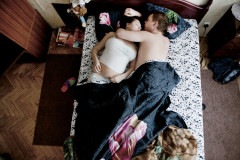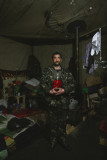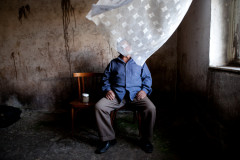- Jana Romanova, aus der Serie Waiting, 2009-2012
- Jana Romanova, aus der Serie Alphabet of Shared Words, 2013
- Jana Romanova, aus der Serie Shvilishvili, 2012/2013
Ausstellungsort: Torhäuser
Öffnungszeiten: Di – Fr 13 – 18 Uhr, Sa + So 11 – 18 Uhr
Eröffnung: Mittwoch, 11.03.2015, 19 Uhr
(English version down below)
Ein Paar. Im Bett. Er hält sie und sie hält ihn. Nackt, schutzlos. Die Intimität der festgehaltenen Szene könnte nicht größer sein. »Waiting«, eine fotografische Serie Jana Romanovas, zeichnet das Gesellschaftsbild junger Erwachsener über die Metapher des Schlafes. Wie die Fotografin selbst, wurden die abgebildeten Paare in der Sowjetunion geboren. Theoretisch steht ihnen alles offen. Doch von großen Sprüngen ist in den spärlich ausgestatteten Wohnungen nichts zu sehen.
Romanova fixiert mit den Portraits träumender werdender Eltern das Sinnbild eines entrückten Schwebezustands. Reglos im Limbus des (politischen) Vakuums festgehalten, scheint für die jungen Erwachsenen alles möglich, aber gleichsam in Frage gestellt. Welche Perspektiven kann diese Generation ihren eigenen Kindern bieten? Aus der hegemonialen Luftperspektive heraus aufgenommen, bringen die Fotografien gleichsam Voyeurismus und Anteilnahme zum Ausdruck und fragen nach einem gesellschaftlichen Masterplan, der doch von den Observierten selbst hervorgebracht werden muss.
Jana Romanova arbeitet mit dem Format des Portraits. Ihr partizipativer Ansatz generiert einen sozialen Aktionsraum, in dem die Fotografin mit den Portraitierten interagiert. Auf dem Maidan fragt Romanova Beteiligte unterschiedlicher politischer Couleur nach Begriffen, die in der russischen und ukrainischen Sprache gleichlauten und stellte den Akteuren die Aufgabe, diese Worte in einem Portraitfoto als Sprachbild vorzustellen. Die für das entstehende »Alphabet of Shared Words« getroffene Auswahl sorgt für Überraschungen und zeigt neben vereinzelten patriotisch besetzten Vokabeln die Gemeinsamkeiten der Sprache und Kultur der politischen Kontrahenten auf.
Der Arbeit »Shvilishvili« (Enkelkind) ging ein privater Wiederannäherungsprozess mit dem georgischen Familienzweig der Fotografin voraus. Im Sinne eines „Anti-Fotoalbums“ reflektiert die Arbeit die Funktion des Familienalbums als kollektives Erinnerungsbild, das die Erinnerung an ein besonderes Ereignis vertieft. Die Arbeit führt dabei visuell die in zwei Länder verteilte Verwandtschaft der Fotografin zusammen, die durch die politischen Rahmenbedingungen und einen tragischen Todesfall den Kontakt zueinander verloren hatte. Als visuelle Konstruktion dieser Familiengeschichte legt das „Anti-Fotoalbum“ in einer medialen Rekonstruktion offen, wie fotografischer Einblick in die persönliche Biografie und die Komplexität individueller Schicksale nicht zur Deckung gebracht werden können, sich der fotografischen Dokumentation und der visuellen Erfassung entziehen.
Die Arbeit »Immerse« hingegen, entstanden 2014, initiierte eine physische Auseinandersetzung junger Erwachsener mit den Hinterlassenschaften politischer Machtdemonstration in Sevastopol auf der Krim.
Als „Eintauchen“ in die Geschichte und als räumliche Interaktion mit den Denkmälern bemühen sich die Portraitierten um Bezüge. Dabei entwickelt ihr ironischer Vergleich zwischen körperlicher Selbstinszenierung und Monument einen kaum schärfer denkbaren Kontrast.
Die Arbeiten der 1984 in St. Petersburg geborenen russischen Fotografin Jana Romanova reflektieren die politischen Spannungen und Krisen der Post-Sowjetunion und die kulturelle Eigenständigkeit, aber auch die Gemeinsamkeiten Russlands und der Ukraine. Dabei ist für Romanovas Arbeiten oftmals das Kontrastieren politisch konträrer Positionen und der Versuch einer spielerischen Versöhnung derselben charakteristisch. Ihre Arbeiten zeichnen sich zudem durch eine beeindruckende Übersetzung theoretischer Reflexion des Mediums der Fotografie in autonome Kunstwerke aus.
Jana Romanova lebt und arbeitet in St. Petersburg. Sie erwarb ihr Diplom im Studiengang Journalismus an der Saint Petersburg State University. Ihre Arbeiten wurden in internationalen Gruppenausstellungen und Festivals wie dem »Encontros da Imagem« (Braga, Portugal), dem »Backlight Festival« (Tampere, Finland), dem »Encuentros Abietros Festival« (Buenos Aires, Argentina), der Ausstellung »Perchance to Dream« in der Andrea Meislin Gallery New York, der Ausstellung »New Saint Petersburg« in der Nieuw Dakota Gallery Amsterdam und der Ausstellung »Me, myself and I« in der Anzenberger Gallery Wien gezeigt. Sie wird von der LookOut Gallery in Warschau, Polen, vertreten, die als erste ihre Arbeiten in Europa zeigten. Als vielversprechende aufstrebende Nachwuchskünstlerin stellt die Einzelausstellung im Museum für Photographie Braunschweig e.V. ein besonderes Moment in der Karriere der noch jungen Fotografin dar.
Gefördert durch
+++
A couple. In bed. He is holding her and she is holding him. Naked, defenceless. The intimacy of the recorded scene could not be greater. »Waiting«, a photographic series by Jana Romanova, portrays the social image of young adults through the metaphor of sleep. The depicted couples, just like the photographer herself, were born in the Soviet Union. In theory, everything is available to them. But in the sparsely furnished apartments there is not much of this to be seen. With her portraits of dreaming parents-to-be, Romanova conjures up the image of an enraptured state of limbo. Captured motionless in the limbo of the (political) vacuum, everything seems possible for these young adults but is at the same time called into question. What perspectives can this generation offer to its children? Recorded from a hegemonic aerial perspective, the photographs express both voyeurism and sympathy and call for a society master plan which must in fact be brought forth by the observed individuals themselves.
Jana Romanova works with the format of the portrait. Her participatory approach generates a space of social action in which the photographer interacts with those portrayed. On the Maidan Independence Square, Romanova asked people there of differing political persuasions for expressions which sound the same in both Russian and Ukrainian and gave those involved the task of presenting these words as a linguistic picture in a portfolio. The selection for the resulting »Alphabet of Shared Words« caused a surprise and shows, apart from a few patriotically coloured words, the common ground between the language and culture of the political adversaries.
The work »Shvilishvili« (grandchild) was preceded by a private process of rapprochement with the Georgian family branch of the photographer. In the sense of an “anti-photo album” the work reflects the function of the family album as a collective visual memory which enhances the memory of a special event. In so doing, the work brings together visually the photographer’s relatives who are spread over two countries and who have lost contact with one another because of the political framework as well as the occurrence of a tragic death. As a visual construction of this family history, the “anti-photo album” reveals in a medial reconstruction how photographic insights into personal biographies and the complexity of individual destinies cannot be made to agree, and that such biographies cannot really be visually captured by photographic documentation.
The work »Immerse«, on the other hand, which arose in 2014, set off a physical confrontation of young adults with the legacies of the political show of force in Sevastopol in Crimea. Immersing in history and interacting spatially with the monuments, the portrayed persons endeavour to find their bearings. In this process, the ironic comparison between physical self-presentation and the monument produces a contrast that can hardly be more sharply defined.
The works of Jana Romanova, who was born in Russia, St. Petersburg, in 1984, reflects the political tensions and crises of the post-Soviet Union as well as cultural independence, but also what Russia and the Ukraine have in common. In the course of this, the contrasting of politically contrary positions and the attempt at a playful reconciliation between these are often characteristic of Romanova’s works. In addition, her works are characterized by an impressive rendering of theoretical reflection of the medium of photography into autonomous works of art.
Jana Romanova lives and works in St Petersburg. She acquired her diploma in journalism at the State University of Saint Petersburg. Her works have been shown in international group exhibitions and festivals like the »Encontros da Imagem« (Braga, Portugal), the »Backlight Festival« (Tampere, Finland), the »Encuentros Abietros Festival« (Buenos Aires, Argentina), the exhibition »Perchance to Dream« in the Andrea Meislin Gallery in New York, the exhibition »New Saint Petersburg« in the Nieuw Dakota Gallery in Amsterdam and the exhibition »Me, myself and I« in the Anzenberger Gallery in Vienna. Her work is represented by LookOut Gallery, Warsaw, Poland, who was the first to show her work in Europe before. As a highly promising and aspiring up-and-coming artist, the solo exhibition in the Braunschweig Museum of Photography represents a very special moment in the career of this still young photographer.



